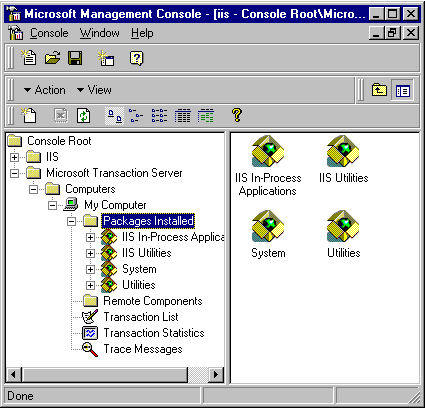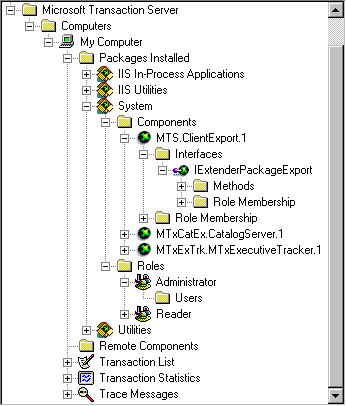
The MTS Explorer is the visual tool used to manage MTS packages and components executing in the MTS run-time environment. You use the MTS Explorer to perform tasks ranging from installing components into packages to monitoring the status of transactions.
The MTS Explorer is a snap-in hosted by the Microsoft Management Console (MMC) on Windows NT and an executable file (mtxpd.exe) on Windows 95. The Explorer contains the following folders in the left tree view hierarchy:
Contains the computers managed from this server. The local computer is named My Computer.
Contains the packages installed on a given computer.
Contains the components on remote computers used by packages on a given computer.
Displays the current transactions in which an MTS application participates.
Displays statistics on the transactions in which the local computer participates.
Lists current trace messages issued by the Microsoft Distributed Transaction Coordinator (MS DTC).

Note The MTS Explorer on Windows 95 has a single pane. To navigate in the MTS Explorer hierarchy on Windows 95, double-click the icons to move down the hierarchy and then click the Up One Level toolbar button to move up the hierarchy.
In addition, you cannot use the Remote Components folder or the application executable utility on Windows 95.
See the MTS Explorer on Windows 95 section of the Road Map to the MTS Administrator's Guide topic for limitations of the MTS Explorer on Windows 95.
Remote computers administered by the MTS Explorer list the Packages Installed, Remote Components, Transaction List, Transaction Statistics, and Trace Messages windows in the hierarchy below the computer icon.
Each package installed in the MTS Explorer contains the following sub-folders:
Contains the components installed in the selected package
Contains the roles available within a package.
Contains the roles assigned to the selected component or component interface.
Contains the users mapped to the role for the package.
Contains the interface(s) for the selected component.
Contains the methods for the selected interface.

See Also
Quick Tour of Microsoft Transaction Server